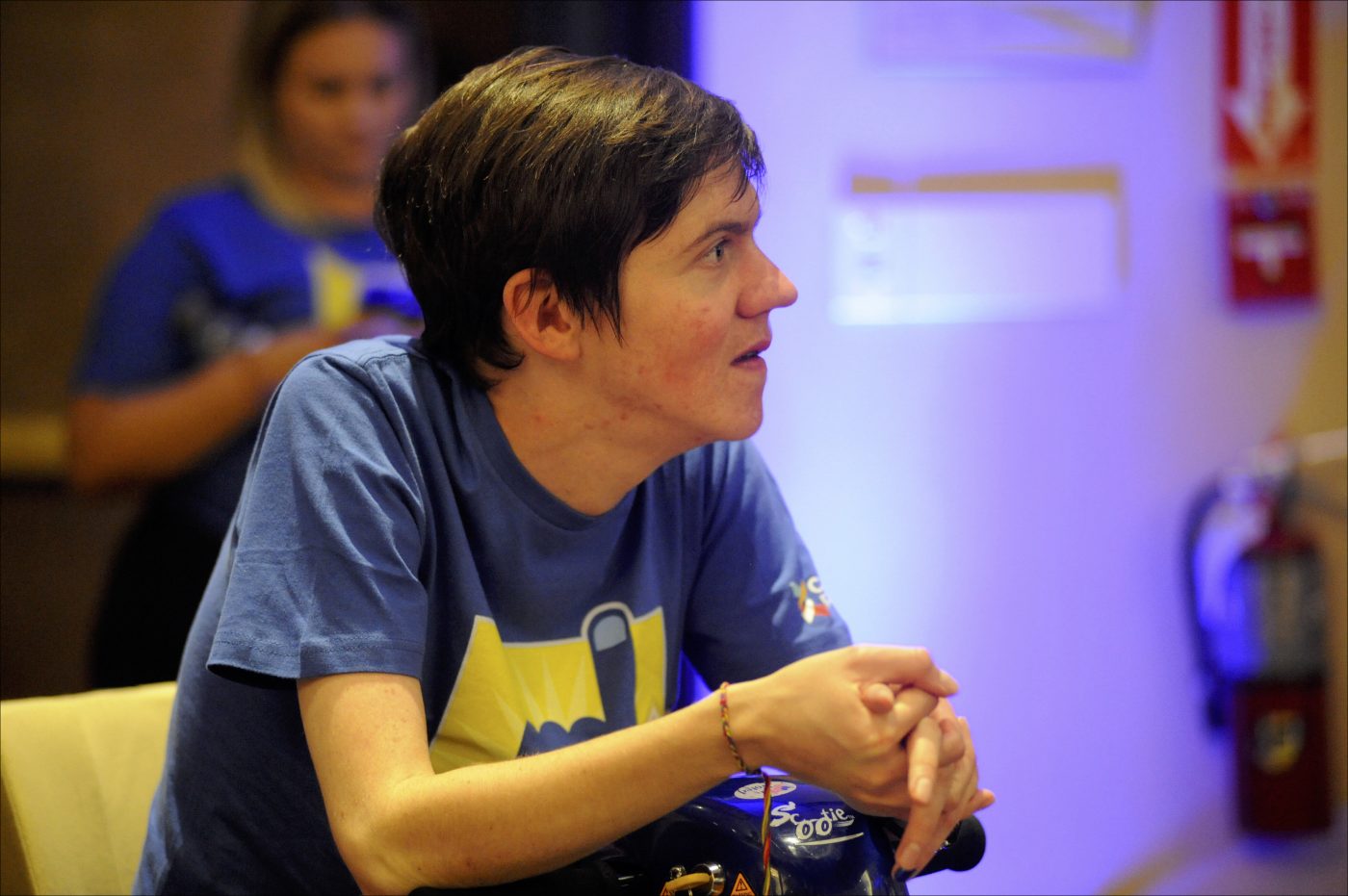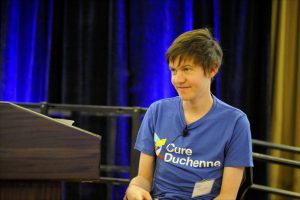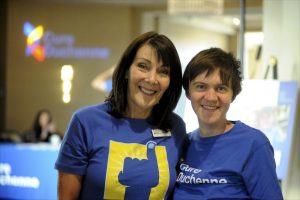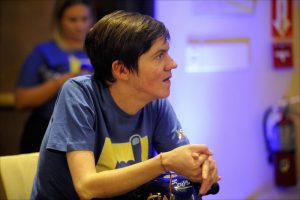Budding Journalist Hawken Miller Offers Advice on Living With Duchenne

Journalism student Hawken Miller is the son of CureDuchenne co-founders Paul and Debra Miller.
At 21, Hawken Miller certainly doesn’t look like a typical Duchenne muscular dystrophy patient.
For one thing, unlike most boys and young men with Duchenne, Hawken isn’t obese — or even overweight — even though he’s been on steroids for years.
That’s because he eats a balanced, high-protein diet with generous helpings of broccoli and other healthy veggies. Hawken, already an expert on the subject, also limits his salt and sugar consumption.
“Sugar can easily turn into fat if you’re not burning it on a consistent basis,” he said. “Broccoli has a lot of fiber. It’s also associated with a lower risk of cancer, and has lots of vitamin K. A lot of restaurants serve way bigger portions than kids with Duchenne should be eating, based on the fact that we’re not burning as many calories as we should.”
He added, with a smile: “Obviously, I don’t give my kids anything, because I don’t have kids.”
Hawken’s dietary tips were among several nuggets of advice offered during his speech, “Learning to Live With Duchenne,” at CureDuchenne’s Futures conference. The event, held Nov. 3-4 in Needham, Massachusetts, attracted about 100 people and featured presentations by many Duchenne experts, including Hawken’s long-time pediatric neurologist, Brenda Wong, MD.
Hawken, the son of CureDuchenne co-founders Paul and Debra Miller, is currently a senior at the University of Southern California (USC) in Los Angeles, where he studies journalism. He’s due to graduate next May.
Join our MD forums: an online community especially for patients with Muscular Atrophy.
Getting enough sleep and water
Once a shy kid because of his disability, Hawken is now flourishing. He’s already done an internship at the Sacramento Bee and currently belongs to a campus religious group, Christian Challenge.
“At school, there aren’t many kids with these disabilities. It’s very important to plug into a community, especially if you’re feeling isolated,” he said. “Boy Scouts is also something I’ve always cherished. It’s a great way to make friends, interact with your classmates and learn how to be a leader.”
At USC, Hawken lives with 13 fellow Christian Challenge members who help clean his room and shop for groceries.
“Duchenne is definitely a struggle for me, but I have God in the picture so it’s not so bad,” he said, adding “service is an important part of following Jesus. I grew up in my faith, and this gives me a lot of hope for the future.”
It helps that Hawken is methodical about taking care of himself.
“This is a super-important part of your health and often gets overlooked, but sleep gives your muscles time to rest and get ready for the next day. I try to get 9 to 10 hours of sleep every night,” he said.
Also important is water consumption; Hawken downs two 32-ounce bottles every day.
“A good way to know if you don’t drink enough water is the color of your pee,” he advised. “If it’s not clear, then you’re not drinking enough.”
‘Virtual journalism’ on the border
Hawken also urged other Duchenne patients to get their flu shots.
“Our immune system isn’t as strong as other people, so it’s really important that you stay on top of your health,” Miller said, estimating that he takes 20 to 30 pills every day. Most of these are supplements to address the side effects of steroids.
Among Hawken’s current medications: Emflaza (deflazacort), a steroid; Fosamax (alendronate) to combat steroid-induced osteoporosis; and the heart medications losartan and eplerenone. He also uses a cough assist machine and a BiPAP machine (for sleep apnea), as well as night splints and wrist splints.
“Stretching is part of my daily routine; hamstrings, wrists and fingers, quadriceps, Achilles tendons, ankles and calves,” he said. “Don’t let Duchenne get in your way. There are so many things you can do, and with enough adaptation, it can work.”
Hawken, who speaks some Spanish, visited the Mexican border town of Tijuana during spring break this year to do some reporting about immigrants deported by U.S. authorities back to Mexico. His virtual-reality journalism class partnered with a local radio station, KCRW, focusing on the theme of newcomers.
“I used my scooter most of the time, and one of my friends, Zeke Hanson, also carried me,” he explained. “The angle of our story ended up being how people are helping deportees get integrated back into Mexican society. We also ended up talking to Maria Galleta, a janitor in San Diego who’s nicknamed ‘Mari Cookie’ and has a small office in Mexico to help recent deportees find jobs there.”
That interview is one episode of a five-part series, “The Deported: Life Beyond the Border,” featured on the class website. During Hawken’s senior year of high school, he traveled with his father to Vietnam. The year before that, he went to Argentina. At USC, he uses an F5 Corpus VS power wheelchair by Permobil to get around.
Faith keeps Hawken going
“Wherever I’ve been — whether it’s Vietnam or Mexico — my travels have allowed me to see things in perspective,” he said. “I may have this disease, but I have so many other things that I can be thankful for, like my friends, my family and my education. We can triumph over death through Christ. My faith gives me strength to do whatever I can in the time I have.”
A cure for Duchenne, said Hawken, would be “incredible,” but he doesn’t dwell on that.
“Thinking about the future is critically important, but I focus on now, and what I can do with what I have — and comforting other people who have the disease.”
His parents couldn’t agree more.
“We believe very strongly that all our boys with Duchenne have a bright future,” said his mother, Debra. “When Hawken was really young — before we knew he had Duchenne — we were pretty sure what his future would be. After he was diagnosed, somebody told me, ‘if you want to see God laugh, tell Him your plans.’ Our life has taken a different route, but we still have a wonderful life and a wonderful family. There are challenges, but there are challenges without Duchenne also.”
Added his father, Paul: “We do not let joy be robbed from us by this disease.”










